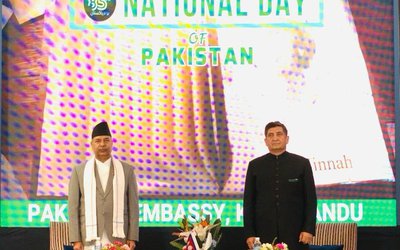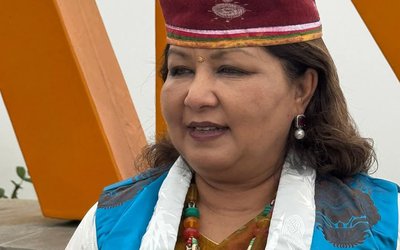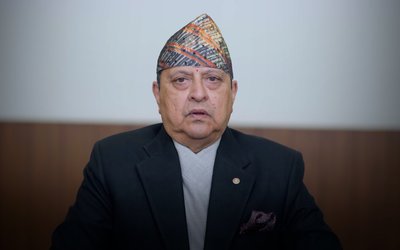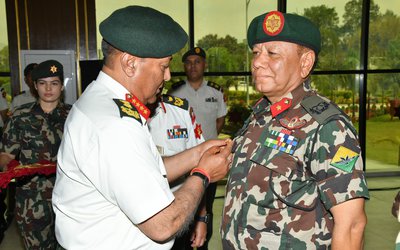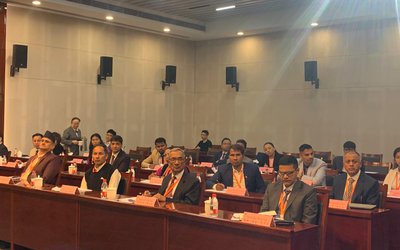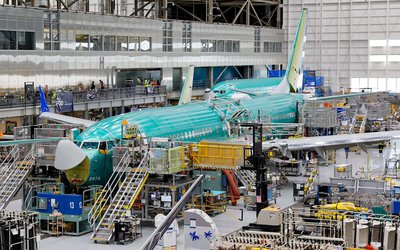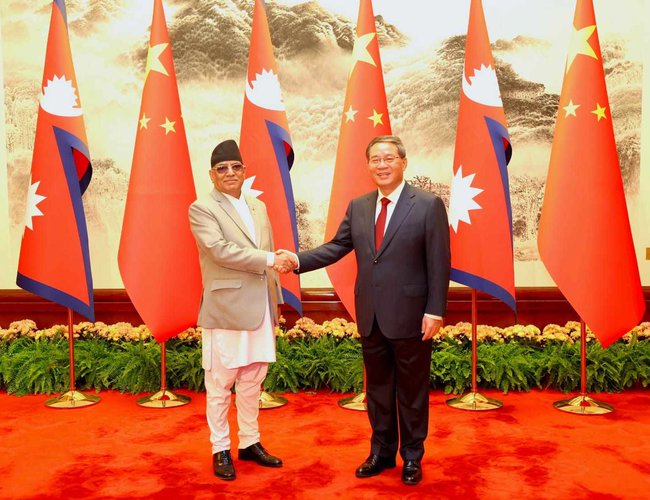
1 At the Invitation of H.E. Li Qiang, Premier of the State Council of the People’s Republic of China, Rt. Honorable Pushpa Kamal Dahal ‘Prachanda', Prime Minister of Nepal, is on an official visit to China from September 23 to 30, 2023 and attended the Opening Ceremony of the 19th Asian Games.
2 During the visit, Prime Minister Pushpa Kamal Dahal ‘Prachanda’ met with President Xi Jinping, held talks with Premier Li Qiang, and met with Chairman of the Standing Committee of the National People’s Congress Zhao Leji. In a warm and cordial atmosphere, leaders of the two countries had in-depth exchange of views and reached extensive consensus on deepening China-Nepal traditional friendship, expanding mutually beneficial cooperation. They also shared views on regional and international issues of mutual interest.
3 The Nepali side extended its congratulations on the success of the 20th National Congress of the Communist Party of China (CPC), and the important outcomes of the annual sessions of China’s National People’s Congress and National Committee of the Chinese People’s Political Consultative Conference. The Nepali side commended China’s achievements in its economic and social development in recent years under the able leadership of President Xi Jinping, and wished the Chinese people greater development and progress. The Chinese side congratulated Nepal on its successful local, provincial and national elections and the formation of the new government, and wished the Nepali people enjoy development and prosperity at an early date.
4 The two sides recalled President Xi Jinping’s historic state visit to Nepal in 2019, during which the bilateral relationship was elevated to a Strategic Partnership of Cooperation Featuring Ever-lasting Friendship for Development and Prosperity, underlining the special significance of high-level exchanges to the development of bilateral relations. The two sides will maintain the momentum of high-level exchanges, deepen political mutual trust, and expand exchanges and cooperation at all levels between the two countries.
5 The two sides agreed that since the establishment of diplomatic relations between the two countries in 1955, China and Nepal had withstood changes of the international situation, always upheld mutual respect, equality, solidarity, 2 mutual assistance and win-win cooperation, setting a fine example of friendly interaction between countries with different social systems and of different sizes. The two sides agreed to further accelerate the implementation of the instruments signed and the important consensus reached between the leaders of the two countries, and, on the basis of the Five Principles of Peaceful Coexistence, the purposes and principles of the United Nations Charter and the principle of good neighborliness and friendship, strengthen strategic communication, pursue high-quality Belt and Road cooperation, and deepen and expand mutually beneficial cooperation in various fields.
6 Acknowledging the history of mutual support in difficult times, the two sides reiterated their commitment to respecting and accommodating each other’s concerns and core interests. The Nepali side reiterated its firm commitment to the one-China principle. Recognizing that the Government of the People’s Republic of China is the sole legal Government representing the whole of China, and Taiwan is an inalienable part of China’s territory, the Nepali side is against “Taiwan independence.” The Nepali side reiterated that Tibet affairs are China’s internal affairs, that it will never allow any separatist activities against China on Nepal’s soil. The Chinese side reaffirmed its commitment to the principle of amity, sincerity, mutual benefit and inclusiveness and the policy of forging friendship and partnership in the neighborhood. China firmly supports Nepal in upholding its independence, sovereignty and territorial integrity, and respects and supports Nepal's independent choice of social system and development path that suits its national conditions.
7 The two sides, while acknowledging the signing of the MoU between the Government of Nepal and the Government of the People’s Republic of China on bilateral cooperation under the framework of the Belt and Road Initiative on 12 May 2017, expressed their commitment to accelerate the consultations to finalize the text on the BRI Implementation Plan at an early date. They expressed readiness to exchange experiences on their development strategies, deepen practical cooperation in such fields as infrastructure connectivity, trade, tourism, production capacity and investment, and further deepen and solidify Belt and Road cooperation to deliver greater benefits to their peoples.
The two sides agreed to strengthen connectivity in such areas as ports, roads, railways, airways and grids in an orderly manner, jointly build the Trans-Himalayan Multi-Dimensional Connectivity Network, work together to ensure the safety of 3 the cooperation projects and company personnel of the two countries, and contribute to Nepal's realization of its development agenda including graduating from the least developed country status at an early date.
The two sides welcomed the successful opening of the Lizi-Nechung port and the reopening of the Zhangmu-Khasa port to passenger services. The two sides applaud the smooth and orderly operation of passenger and cargo services at Pulan and Jilong ports. The Chinese side will extend its support to improve the facilities on the Nepali side of the Lizi-Nechung port at the earliest possible time. The Chinese side agreed to work for the early reopening of eligible traditional China-Nepal border trade points.
The two sides agreed to maintain communication for the opening of Chentang-Kimathanka, Riwu-Olangchungola ports at an early date.
The two sides agreed to continue to implement the signed cooperation documents concerning transit transport and utilization of highways in China to help turn Nepal from a land-locked country to a land-linked country. In light of Nepal's needs, the Chinese side is ready to start the fourth phase of the Araniko Highway maintenance project. The Chinese side is ready to start repairing the Syaphrubesi-Rasuwagadhi Highway as soon as possible after the Nepali side completes its demolition work.
Both sides agreed to accelerate the feasibility study of the Tokha-Chhare Tunnel project, recognizing that the project will elevate the level of connectivity between the two countries.
The two sides agreed to expedite the implementation of the second phase of the Kathmandu Ring Road project.
8 The two sides expressed satisfaction over the progress of the feasibility study of the Jilong/Keyrung-Kathmandu Cross-Border Railway, and planned to hold the 8th Working Meeting on China-Nepal Railway Cooperation as early as possible. The Chinese side is ready to help Nepal train railway professionals.
The two sides welcomed the consensus reached between the civil aviation authorities of the two countries on expanding the air rights arrangements, and expressed satisfaction over the completion and operation of the Pokhara International Airport.
The two sides support and encourage their airlines to resume and open more flights and air routes, including ones connecting Pokhara, in accordance with bilateral air rights arrangements and in light of market needs, so as to facilitate trade and economic interactions and people-to-people exchanges.
The two sides will further promote cooperation in the field of energy, particularly the development of hydropower and cross-border transmission lines and associated substations.
The two sides will continue working toward the finalization of China-Nepal Electric Power Cooperation Plan by convening the second meeting of the Joint Implementation Mechanism at the earliest. The two sides will launch the construction of the Jilong/Keyrung-Rasuwagadhi-Chilime 220 KV Cross-Border Power Transmission line at an early date.
The two sides will continue to make good use of the platform of the China-Nepal Joint Implementation Mechanism. The Mechanism will carry out exchanges and cooperation in the field of hydropower, wind power, solar power, biomass power and hydrogen.
The Chinese side agreed to positively consider the request made by the Nepali side for supplying grid power to electrify northern remote villages of Nepal from Xizang Autonomous Region of China, and take overall consideration of providing equipments or technology on commercial terms.
The two sides expressed satisfaction over bilateral cooperation in all areas, and agreed to further deepen mutually beneficial cooperation in such fields as economy and trade, investment, agriculture, tourism, production capacity, poverty alleviation, health and education to promote common development.
The two sides expressed satisfaction over the Second Working Group Meeting on Trade Facilitation recently held in China, which they view as conducive to facilitating bilateral economic and trade exchanges.
In order to promote trade and investment between the two countries, both sides pledged to provide a fair, transparent and non-discriminatory business environment for each other’s business community operating in either side.
The two sides welcomed the arrival of the first batch of transit cargo on 7 September 2023 from the third country to Nepal by utilizing Chinese transit facilities under the Transit Protocol signed between Nepal and China.
In terms of the Project Development Agreement of China-Nepal Friendship Industrial Park, Investment Board of Nepal and Lhasa Economic and Technological Development Zone Investment Development Company have both unanimously agreed to accelerate the negotiation process and complete the signing of the PDA as soon as possible so as to commence construction and operations at an early date.
The two sides signed MoU to establish a joint technical working group to review and modify the Trade and Payment Agreement.
The two sides agreed that Nepal’s participation as a theme country in the 7th China-South Asia Expo in August 2023 injected fresh vigor and vitality into their bilateral economic and trade cooperation.
The Chinese side welcomed Nepal’s participation in the 6th China International Import Expo to be held in Shanghai in November 2023.
The two sides welcomed the renewal of the Memorandum of Understanding on Cooperation in the Field of Agriculture, Livestock and Fisheries between the Ministry of Agriculture and Rural Affairs of the People’s Republic of China and the Ministry of Agriculture and Livestock Development of Nepal, and believed that the MoU would elevate the level of agricultural cooperation between the two countries, and agreed to hold the 4th Joint Commission Meeting on Nepal-China Agricultural Cooperation as early as possible.
The two sides are ready to explore the joint development of an Agriculture Industrial Demonstration Park to further promote cooperation on agriculture. The Nepali side will actively work on the location and cooperation proposal of the Demonstration Park.
8 The Nepali side expressed its appreciation to the Chinese side for granting zero-tariff treatment to 98 percent of taxable products from Nepal.
The Chinese side is ready to continue taking active measures to facilitate the export of Nepali products to China.
The two sides welcomed the successful export of Nepali haylage to China and the signing of the Protocol of Phytosanitary Requirements for Export of Plant-derived Medicinal Materials for the Chinese Medicine from Nepal to China between the Ministry of Agriculture and Livestock Development of the Government of Nepal and the General Administration of Customs of the People’s Republic of China, and expressed readiness to speed up the approval process for the export of cooked buffalo meat products from Nepal to China, which the two sides view as a positive step forward to reducing trade imbalances between the two countries.
The Chinese side is ready to assist the Nepali side in meeting the phytosanitary requirements for the export of Nepali citrus fruits to China and in establishing a multifunctional quarantine laboratory in Nepal.
The Chinese side has agreed to carry out exchanges and cooperation with the Nepali side on variety breeding and standardized scale culture of Yak, Nak and mountain goats (Chyangra).
The two sides welcomed the launch of the “Lighting Up the Future” China-Nepal Political Parties’ Livelihood and Poverty Alleviation Action in Nepal, and the unveiling of “Vibrant Village,” a demonstration project of the China-South Asian Countries Poverty Alleviation and Cooperative Development 6 Center, and expressed readiness to expand exchanges and cooperation in such areas as poverty alleviation, development, livelihood improvement and rural revitalization.
The two sides commended their mutual support in fighting COVID-19 together.
The two sides expressed satisfaction over the completion and handover of the China-aided project of upgrading and renovating the Civil Service Hospital in Nepal, and are ready to further strengthen health and medical cooperation, including expediting the installation of a Bone Marrow Transplant Service at the B.P. Koirala Memorial Cancer Hospital in Nepal.
The Chinese side expressed its willingness to actively consider further requests for assistance programs made by the Nepali side.
The Chinese side is willing to explore methods with Nepal to gradually expand the scale of cooperation on the basis of joint education, in an effort to support Madan Bhandari University for Science and Technology.
The two sides welcomed the establishment of the China-Nepal Traditional Medicine Cooperation Commission in accordance with the Memorandum of Understanding on Traditional Chinese Medicine of People’s Republic of China and the Ministry of Health and Population of Nepal. Both sides will continue to support the China-Nepal Traditional Chinese Medicine Center in providing free medical treatment, personnel training, medical services, etc. in Nepal, and support the Chinese medical team in Nepal in establishing a new medical facility in Kathmandu.
9 The Nepali side expressed its appreciation for China’s valuable support for the economic and social development of Nepal.
The two sides agreed to expedite the implementation of the post-earthquake reconstruction projects that had been agreed upon.
The two sides are ready to further discuss expanding cooperation on emergency management and disaster prevention, reduction and relief. The Chinese side is ready to advance the project of offering technical assistance to the information platform of the National Emergency Operation Center Project in Nepal, and work for the sound operation and maintenance of the China-aided Earthquake Monitoring Network Project in Nepal.
The two sides agreed to carry out exchanges in such fields as seismology, seismic zonation and earthquake resistance of historic buildings. The Chinese side will provide technical training to the Nepali side on disaster prevention and reduction.
10 The two sides agreed to undertake joint inspection of China-Nepal boundary. The two sides agreed to bring into force the Agreement Between the Government of the People’s Republic of China and the Government of Nepal on the Boundary Management System as soon as possible.
The two sides agreed to continue consultations on the Protocol between the Ministry of Public Security of the People’s Republic of China and the Ministry of Home Affairs of Nepal on the Establishment of Boundary Contact System at Three Levels, so as to elevate the level of border management and cooperation between the two countries.

The two sides maintained that law enforcement cooperation is of great significance to the security of the two countries, and agreed to further strengthen information exchange, capacity building and cooperation on training between their law enforcement institutions.
The two sides agreed to expedite the ratification of the China-Nepal Treaty on Mutual Legal Assistance in Criminal Matters.
11 The two sides are ready to step up exchanges and cooperation at all levels in such areas as education, science and technology, telecommunication, culture, tourism, radio and television, think tank, and youth.
The two sides expressed satisfaction over the signing of the Agreement between the Ministry of Education, Science and Technology of the Government of Nepal and the Ministry of Science and Technology of the People’s Republic of China on Cooperation in the Fields of Science and Technology and Innovation.
The two sides agreed to discuss cooperation in such areas as digital economy, digital infrastructure and artificial intelligence, among others. The two sides support more friendly exchanges and cooperation between their scholars, students, artists and private sector entrepreneurs.
The Chinese side will continue to support Nepal’s cultural and tourism institutions at various levels in participating in flexible formats in the cultural and tourism exchange activities held by China and organizing tourism promotion events in China, and will encourage more Chinese tourists to visit Nepal.
The two sides agreed to declare the Year 2025 as the Nepal Visit Year in China with a view to promoting Chinese tourists in Nepal. The Chinese side welcomed Nepali friendship organizations’ participation in the 8th China South Asia Friendship Organizations' Forum.
The two sides look forward to establishing a sister city relationship between various cities of the two countries to promote and deepen the people-to-people contacts.
The two sides expressed satisfaction over the signing of the MoU between the National Administration of Press and Publication of the People’s Republic of 8 China and the Ministry of Culture, Tourism and Civil Aviation of the Government of Nepal on the Translation and Publication of Classics.
The Nepali side pledged to provide the Chinese side a pair of Ek Singhe Gaida (unicorn rhino) as a gift from the Government and people of Nepal to the Government and people of China, as a symbol for the long-lasting friendship between the two countries.
The Chinese side is ready to support Chinese language education in Nepal by providing more Chinese language testing services and sending Chinese language teachers and volunteers to Nepal.
The two sides will continue to give play to the role of China Cultural Centre, Confucius Institutes, and Confucius Classroom in Nepal promoting China-Nepal cultural exchanges and cooperation.
12 The two sides stressed the importance to uphold true multilateralism, promote greater democracy in international relations, and make global governance more just and equitable. The two sides agreed to strengthen cooperation within the framework of the United Nations and other multilateral mechanisms to uphold the common interest of developing countries.
The two sides support the multilateral trading system, and oppose protectionism. They will work together to make economic globalization more open, inclusive, balanced and beneficial for all, promote global and regional peace, security, development and prosperity, and build a community with a shared future for mankind.
The Nepali side supports the Global Development Initiative (GDI) proposed by China, and will consider to join the Group of Friends of the GDI. The Chinese side is ready to strengthen experience sharing on development with the Nepali side.
13 The two sides expressed satisfaction over the outcomes of Prime Minister Prachanda’s visit to China, and agreed that the visit is of great significance to advancing the China-Nepal Strategic Partnership of Cooperation Featuring Ever-lasting Friendship for Development and Prosperity. Prime Minister Prachanda expressed appreciation to the Chinese Government and people for their warm and friendly reception, and invited Chinese leaders to visit Nepal. The Chinese leaders thanked Prime Minister Prachanda for the invitation, and the two sides will maintain communication via diplomatic channels.
- Pakistani Embassy In Kathmandu Hosted A Reception On 85th National Day
- Apr 16, 2025
- Earthquake Rocks Kathmandu Valley
- Apr 16, 2025
- Prof Dr Khadga KC assigned responsibility of TU Vice Chancellor
- Apr 16, 2025
- Weather Forecast: Partly Cloudy With Brief Rain In Kathmandu, Surkhet And Pokhara
- Apr 16, 2025
- Continuous Earthquake Tremors In Jajarkot
- Apr 15, 2025
